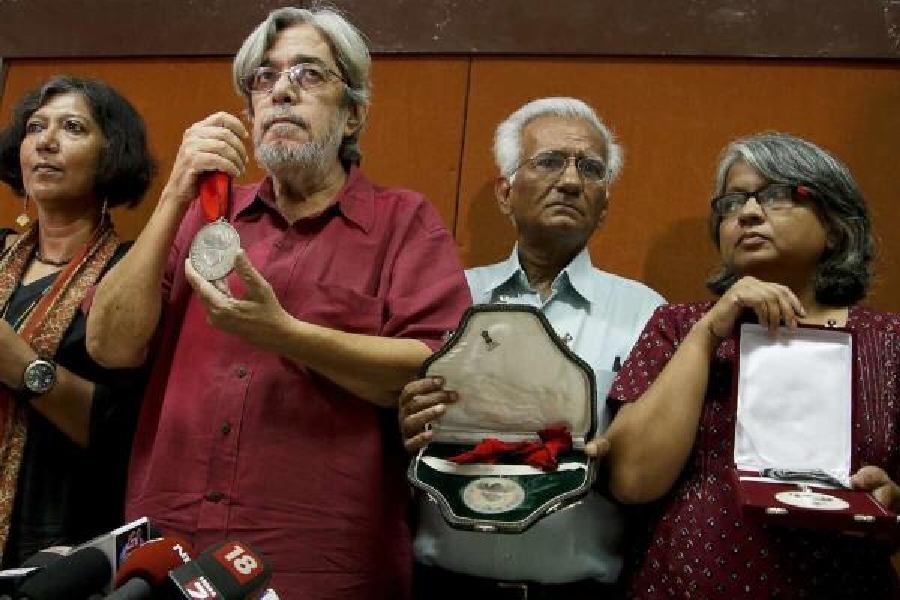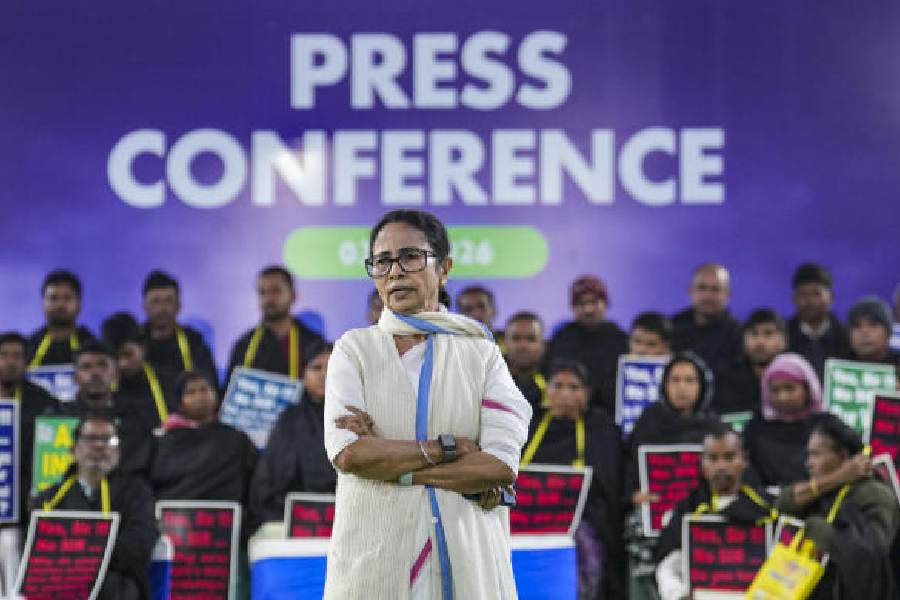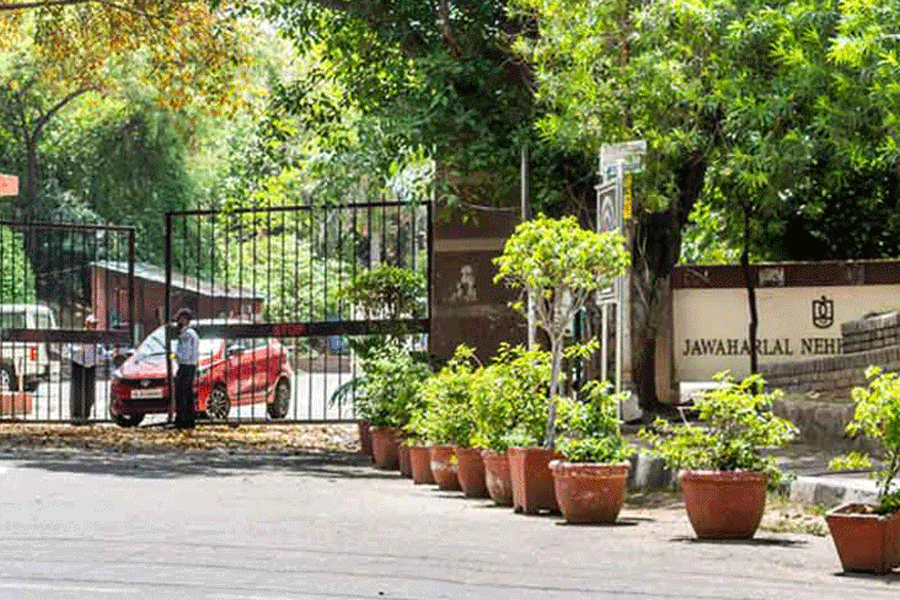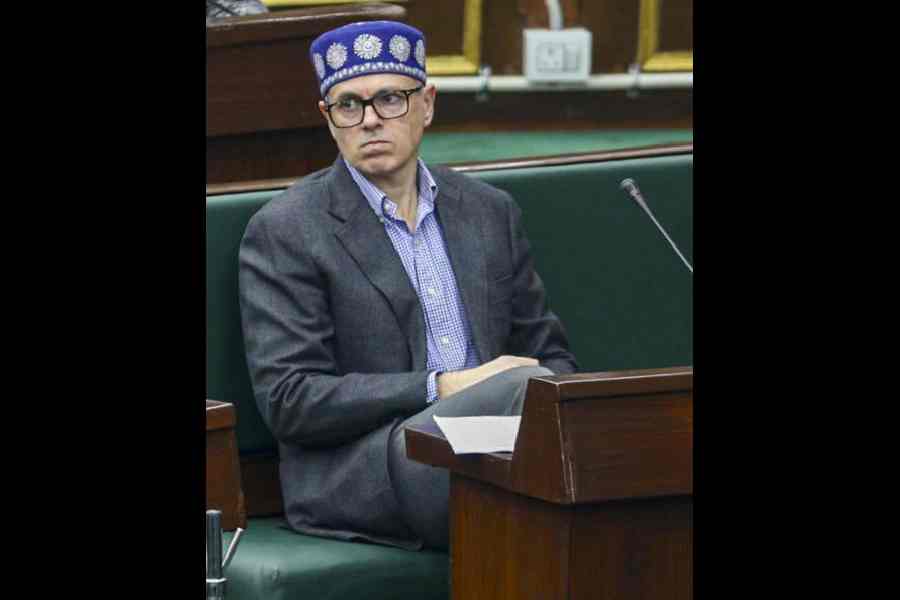A parliamentary committee has proposed that recipients of State awards should sign an undertaking never to return them by way of protest. The proposal extends beyond actual State honours like the Padma awards to those from notionally autonomous bodies like the Sahitya Akademi. The latter’s honorands have indeed returned awards in the past, at least once en masse.
This seems a curious demand of our most outstanding citizens. The nation should be guided by their judgement instead of seeking to curb it. Their protest in a public cause should give us pause to think. A rare individual might act eccentrically, or even wrong-headedly, whether from ‘artistic temperament’ or other cause. The nation’s shoulders are broad enough to absorb the irritant. If a still rarer honorand commits a truly grave offence, the law will take due action. It cannot detract from that person’s achievement in literature, art, sport or whatever.
Returning an award, says the committee, is to disgrace the country. That is what P.T. Usha, whom too we hold in honour, said of the wrestlers’ protest, without acknowledging what the protest was against. Were those charges not a worse disgrace? After all, the awardees set out with a credit balance: they have brought honour to the country, and an appreciative country has honoured them in return. The awards are not gifts or prizes, still less sops or bribes. They cannot come with strings attached. No self-respecting person, especially those of worth and eminence, would accept one on those terms. The only recipients would be those willing to abject their judgement, conscience and professional commitment to the reigning political dispensation. Sooner rather than later, the award itself would stand discredited, as a testimony not to talent or achievement but to partisan loyalty or, at best, a docile avoidance of controversy. Every schoolchild knows the difference between standing first in class and winning the good conduct prize.
In the great majority of cases, the awardees may not be particularly opposed to the State or inclined to dramatic protests. They may still feel such a diktat offends their dignity and their freedom of thought and operation. I never eat oysters, but I would object to being forbidden to do so by law. I might even risk indigestion by tasting them to assert my independence.
There is a paradox in authoritarian attempts to control intellectual and artistic activity. The rulers recognize the power of writers, artists, or even academics to move and influence people. This induces both greed and fear: greed to employ that power in their own cause, and fear of finding it employed against them. They therefore apply their own readier power to tame this awesome force, usually by ten parts stick to one part carrot, reducing it to manageable stature where they can control it because they need no longer fear it. The masters of such regimes lack the confidence to deal with the exceptional, be it persons, forces or situations. They evade such challenges for as long as they can, by silence or diversionary ploys; where this is not possible, they trivialize the issue. Either way, they try to distract the public from treating serious matters with the depth and respect called for.
We are witnessing this syndrome on a virulent scale in the government’s response or non-response to the situation in Manipur. I do not say this to trivialize the horror and turmoil — that would subvert my own argument — but rather to stress it, to deplore the endemic trivialization of Manipur’s continuing ordeal. It is demented to compare it with the deplorable but disjunct evils abounding in every Indian state. That can only be done by cherry-picking stray examples from the unceasing horrors of Manipur and simply disowning the rest. Ultimately, our betrayal of Manipur is an intellectual failure, a surrender to illogic and obfuscation.
The philosopher Hannah Arendt spoke from experience of the ‘banality of evil’ in Nazi Germany, whereby hateful and inhuman things become familiar and unexceptionable. A nation must be assiduously trained to accept disorder on this scale. The people’s values and priorities must be undermined in less obtrusive, less contentious ways in every sphere. The lesson must be driven home that nothing is more crucial than the momentary accidents of rule and powerplay. Those even remotely likely to demur must have their voices silenced if they can’t be suppressed by cruder means. The proposed ban on award wapsi is one of many ploys to that end.
In recent times, many high-ranking retired soldiers have spoken to the press on various matters concerning India’s borders and security, or on conditions within the forces. Virtually none of them has divulged their names. AIIMS is reportedly considering a six-year cut-off for research appointments. Many faculty members of the nation’s leading medical research centre have condemned this breathtaking assault on the continuity of research; but not one who spoke to The Telegraph agreed to be named. They are understandably concerned about their next grant. One understands a circular has gone out imposing silence on army pensioners. Being men of discipline, they have accepted this curb with dignity where unruly academics would have turned obstreperous.
In such a milieu, it hardly seems worth noting that students at more and more institutions are admitted under bond that they will refrain from all protest and criticism. Some extend the ban to the students’
families. Such demands can border on the farcically irrational, like asking students to certify they are not mentally disordered, or pledge not to carry out anti-national acts. Clearly, such authorities have scant respect for the general rule of law. They must replace it with their own petty despotism on their home plots.
Pettiness can acquire its own might, and bullies blossom into very passable despots. We might feel they are best left to work off steam on marginal issues like literary prizes. That would be a mistake. It would not divert their attention from more vital matters. Rather, it would add zest to their efforts everywhere.
Sukanta Chaudhuri is Professor Emeritus, Jadavpur University










